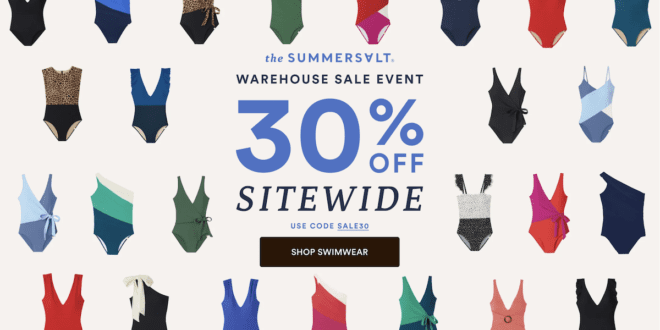—
Summer Marketing Strategies for Travel-Adjacent Brands
As the summer weather heats up, so too do retailers’ plans for seasonal marketing. For travel-adjacent brands, the summer season presents the ultimate opportunity to showcase their offerings and boost sales. However, with competition being intense, retailers are faced with the challenge of surpassing last year’s strong travel numbers to attract customers. To achieve this, travel-related brands are employing creative tactics such as introducing new products, opening new storefronts, and launching new promotions, all aimed at enticing shoppers and ensuring their continued patronage.
Summersalt: A Swimwear Brand that Thrives in Summer
Summersalt, a swimwear brand that expanded to include various other apparel, regards summer as its “absolute peak” for swimwear sales. According to CEO Lori Coulter, the brand experiences the highest level of activity during the months of May, June, July, and August. Additionally, Coulter mentioned that many customers purchase swimwear throughout the year. In order to maintain a constant sense of freshness and newness, Summersalt regularly introduces new products on its website, with plans to continue doing so until July. The brand is also testing new silhouettes and colors that might become permanent additions to its core line. Recent collaborations, such as the one with Diane von Furstenberg, have seen tremendous success, with products selling out within a week and a half.
Summersalt’s current marketing strategy involves its second annual warehouse sale, which offers a 30% discount on the entire site. This sale is being promoted across the brand’s social media channels and through its ambassador network. Ambassadors have been actively posting content related to the sale, creating visibility and generating excitement among potential customers. Summersalt adopts a multi-channel approach, utilizing direct mail and paid marketing to further promote its products and expand its customer base.
Béis: Expanding Offerings for Summer
Béis, a luggage brand founded in 2018, has also recognized the potential of the summer season and has capitalized on it by expanding its offerings. Earlier this year, the brand introduced its first-ever line of luggage and accessories for children, featuring bright and vibrant shades. In addition, Béis recently launched its Béisics collection, which includes backpacks, duffle bags, totes, and laptop cases, all available in popular colorways like black, grey, and beige. One notable aspect of the Béisics collection is its affordability, as it features a lower price point compared to the regular Béis collection.
Béis is actively investing in physical retail, evident from its recent warehouse sale held in Rancho Cucamonga, California. The brand is also planning exciting activations called “Béis Hotel” in three cities this summer, namely Los Angeles, Vancouver, and Dallas. These activations serve as engaging experiences for customers and help to significantly boost brand visibility. The success of Béis can be attributed to its founder, actress Shay Mitchell, who aimed to create affordable and high-quality travel products for herself and fellow travelers. The brand has achieved tremendous growth, surpassing $120 million in profitable gross revenue in March and is projected to reach $200 million in the upcoming fiscal year.
Away: Increasing Focus on Physical Retail
Away, a luggage brand established in 2015, has recognized the importance of physical retail in its long-term strategy. This summer, the brand plans to open a new store in Washington, D.C.’s Georgetown neighborhood, adding to its growing number of locations. Away recently hosted a two-day pop-up event in Venice, California, which utilized AI technology to create personalized travel experiences for participants. The event aimed to promote Away’s “Extraordinary Is Out There” campaign and received a significant amount of engagement. Away has also leveraged traditional advertising channels, such as a full-page ad in the New York Times, as well as out-of-home ads near its stores in Los Angeles and New York City.
In terms of product expansion, Away recently launched its Canvas Collection, which features totes, bags, and pouches in golden hues. Additionally, the brand introduced a collaboration with Brooklyn-based fashion designer Willie Norris, providing fans with the opportunity to win customized luggage and other exciting prizes. The market demand for travel-related products remains strong, with over 80% of Away’s consumers expressing their intention to travel more. This offers significant growth potential for the brand.
Commonalities and Important Factors for Travel-Adjacent Brands
Although each travel-adjacent brand employs unique strategies, some commonalities can be observed across different sectors. For instance, many direct-to-consumer luggage brands tend to resist discounts and promotions, preferring to focus on product quality and customer experience. However, swimwear brands, in particular, have been more inclined to offer discounts and capitalize on seasonal sales opportunities.
Furthermore, the influence of online marketplaces like Amazon should not be overlooked. Events such as Amazon Prime Day can greatly impact retailers’ marketing and promotional strategies, generating substantial sales for participating brands. The partnership between Victoria’s Secret and Amazon, allowing the former to sell apparel, including swimwear, directly on the platform, exemplifies the desire of brands to tap into this online marketplace.
Positive Outlook for Travel-Adjacent Brands
Despite concerns about surpassing last year’s summer sales, travel-related companies remain confident in their strong position. The AAA predicts record-breaking numbers of travelers during the Fourth of July weekend, indicating an eager consumer base. Demand for travel is expected to remain high throughout the summer season, presenting ample opportunities for retailers in this sector. As long as brands continue to innovate, deliver new and exciting experiences, and adapt to evolving consumer preferences, the future looks promising for the travel-adjacent retail industry.
 Mind Uncharted Explore. Discover. Learn.
Mind Uncharted Explore. Discover. Learn.


